Analysis of Strategy Development and Knowledge Management in Google
VerifiedAdded on 2021/02/20
|12
|3252
|28
Report
AI Summary
This report provides an in-depth analysis of Google's strategy development and knowledge management practices. It explores the importance of knowledge in strategic development, marketing, sustainability, and achieving a competitive advantage. The report examines Google's approach to organizational learning, including the application of Nonaka's model for knowledge creation and transfer. It also discusses the role of knowledge workers within the company and how Google leverages both explicit and tacit knowledge to achieve its organizational goals. The report delves into the three levels of organizational learning within Google – single loop, double loop, and deutero learning – and emphasizes the significance of customer knowledge and sustainable business practices. Furthermore, it highlights how Google's effective knowledge management contributes to its success in the technology industry. The report concludes by emphasizing the importance of continuous learning and adaptation in maintaining a competitive edge.
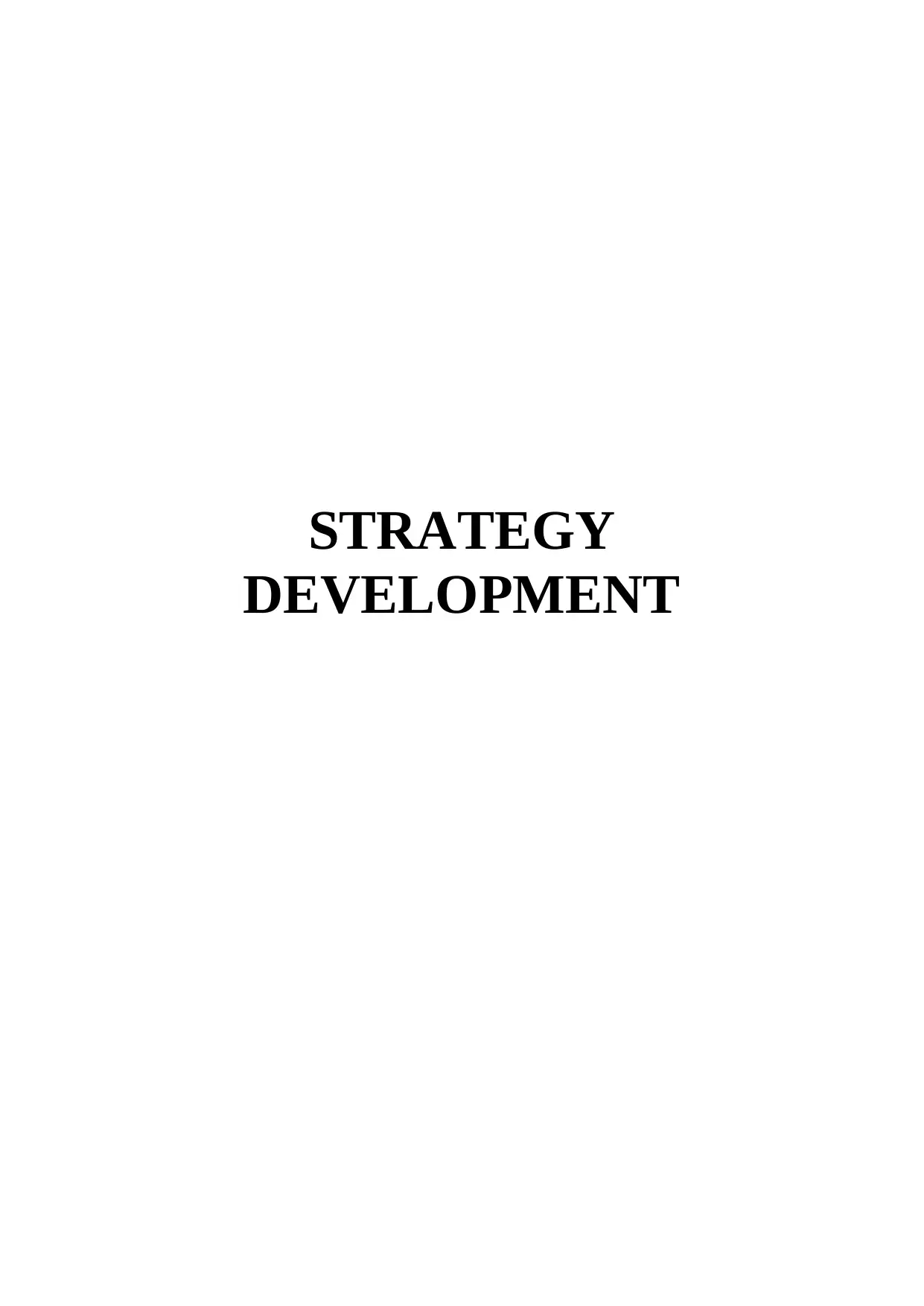
STRATEGY
DEVELOPMENT
DEVELOPMENT
Paraphrase This Document
Need a fresh take? Get an instant paraphrase of this document with our AI Paraphraser

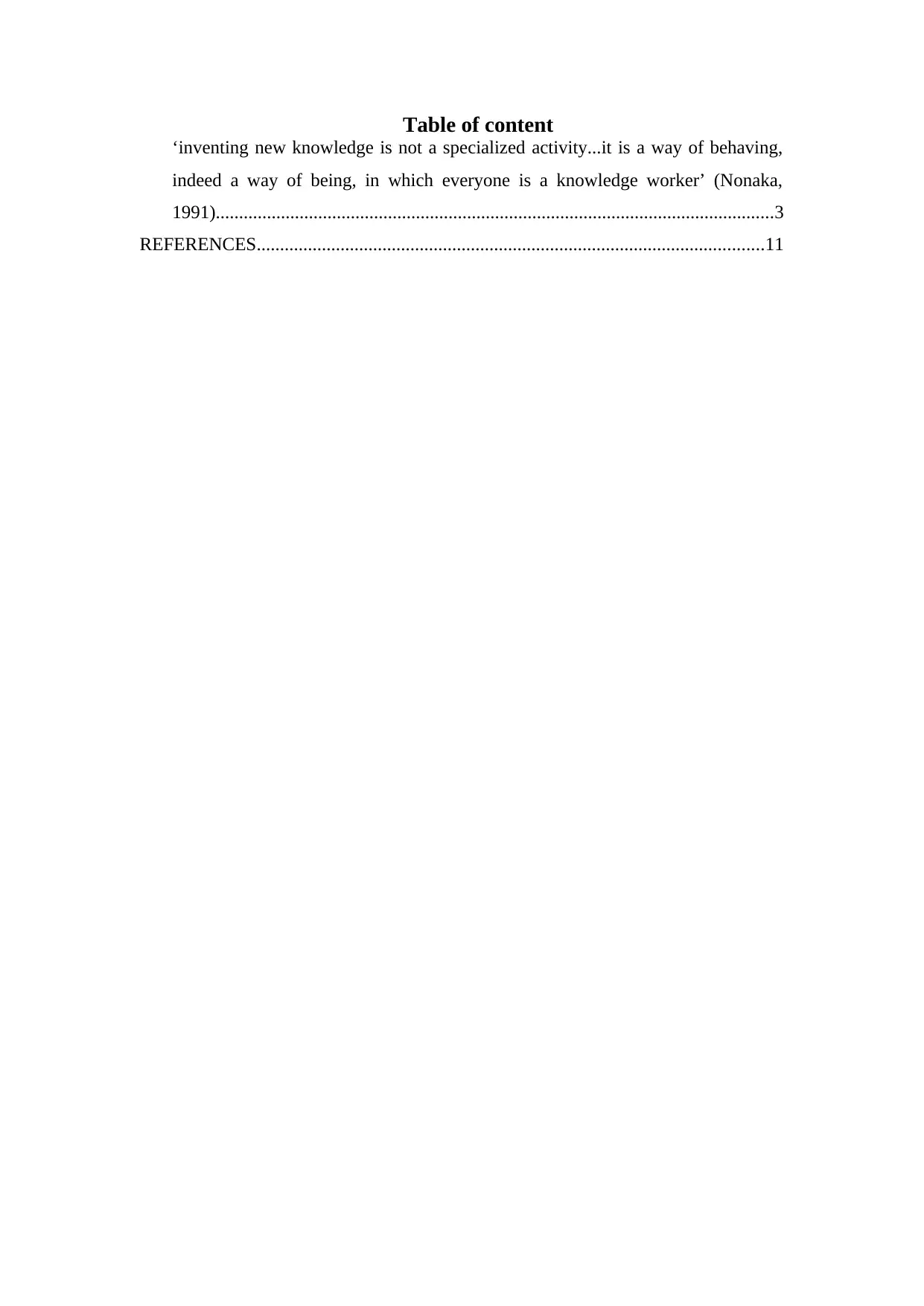
Table of content
‘inventing new knowledge is not a specialized activity...it is a way of behaving,
indeed a way of being, in which everyone is a knowledge worker’ (Nonaka,
1991)........................................................................................................................3
REFERENCES.............................................................................................................11
‘inventing new knowledge is not a specialized activity...it is a way of behaving,
indeed a way of being, in which everyone is a knowledge worker’ (Nonaka,
1991)........................................................................................................................3
REFERENCES.............................................................................................................11
⊘ This is a preview!⊘
Do you want full access?
Subscribe today to unlock all pages.

Trusted by 1+ million students worldwide
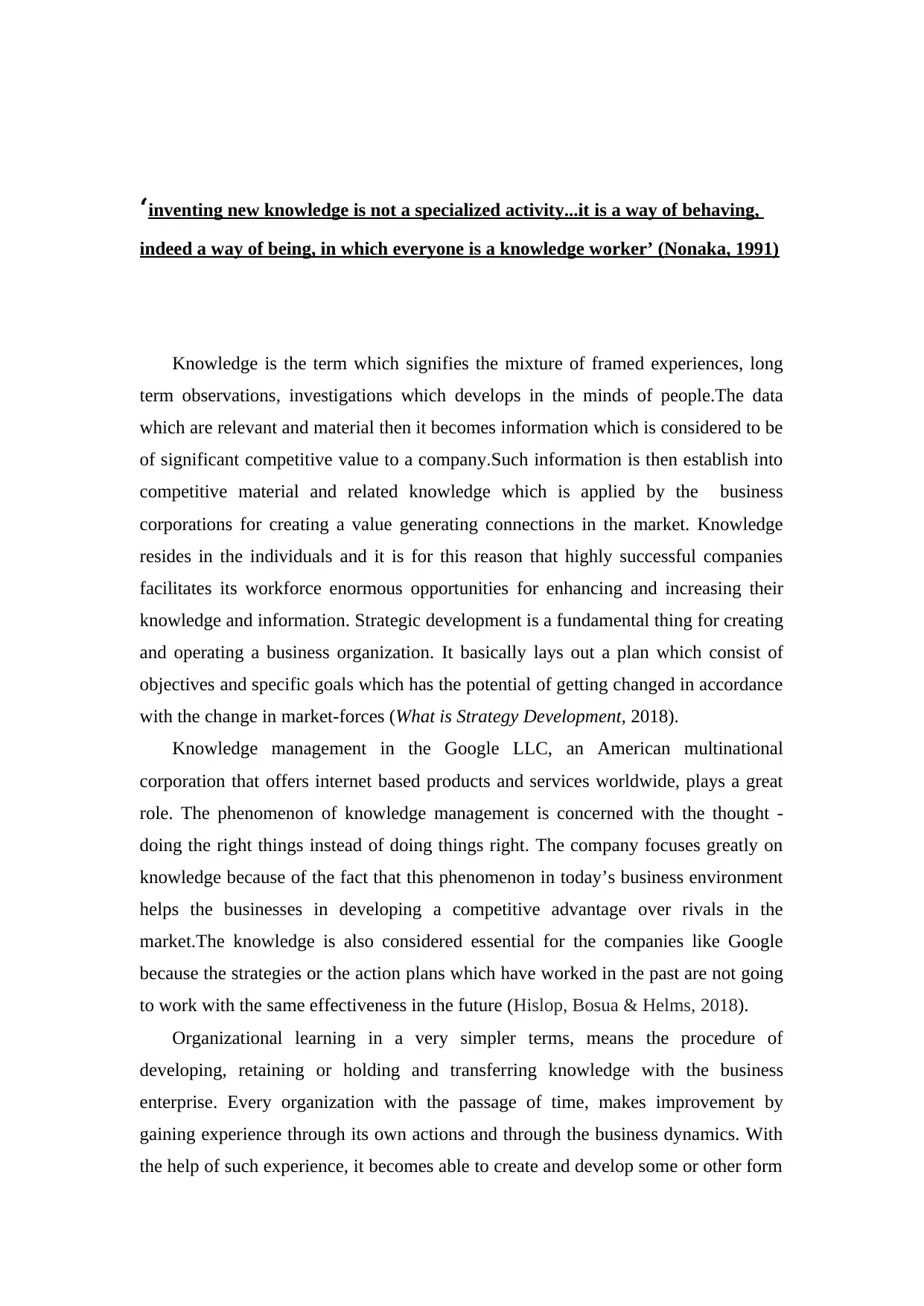
‘inventing new knowledge is not a specialized activity...it is a way of behaving,
indeed a way of being, in which everyone is a knowledge worker’ (Nonaka, 1991)
Knowledge is the term which signifies the mixture of framed experiences, long
term observations, investigations which develops in the minds of people.The data
which are relevant and material then it becomes information which is considered to be
of significant competitive value to a company.Such information is then establish into
competitive material and related knowledge which is applied by the business
corporations for creating a value generating connections in the market. Knowledge
resides in the individuals and it is for this reason that highly successful companies
facilitates its workforce enormous opportunities for enhancing and increasing their
knowledge and information. Strategic development is a fundamental thing for creating
and operating a business organization. It basically lays out a plan which consist of
objectives and specific goals which has the potential of getting changed in accordance
with the change in market-forces (What is Strategy Development, 2018).
Knowledge management in the Google LLC, an American multinational
corporation that offers internet based products and services worldwide, plays a great
role. The phenomenon of knowledge management is concerned with the thought -
doing the right things instead of doing things right. The company focuses greatly on
knowledge because of the fact that this phenomenon in today’s business environment
helps the businesses in developing a competitive advantage over rivals in the
market.The knowledge is also considered essential for the companies like Google
because the strategies or the action plans which have worked in the past are not going
to work with the same effectiveness in the future (Hislop, Bosua & Helms, 2018).
Organizational learning in a very simpler terms, means the procedure of
developing, retaining or holding and transferring knowledge with the business
enterprise. Every organization with the passage of time, makes improvement by
gaining experience through its own actions and through the business dynamics. With
the help of such experience, it becomes able to create and develop some or other form
indeed a way of being, in which everyone is a knowledge worker’ (Nonaka, 1991)
Knowledge is the term which signifies the mixture of framed experiences, long
term observations, investigations which develops in the minds of people.The data
which are relevant and material then it becomes information which is considered to be
of significant competitive value to a company.Such information is then establish into
competitive material and related knowledge which is applied by the business
corporations for creating a value generating connections in the market. Knowledge
resides in the individuals and it is for this reason that highly successful companies
facilitates its workforce enormous opportunities for enhancing and increasing their
knowledge and information. Strategic development is a fundamental thing for creating
and operating a business organization. It basically lays out a plan which consist of
objectives and specific goals which has the potential of getting changed in accordance
with the change in market-forces (What is Strategy Development, 2018).
Knowledge management in the Google LLC, an American multinational
corporation that offers internet based products and services worldwide, plays a great
role. The phenomenon of knowledge management is concerned with the thought -
doing the right things instead of doing things right. The company focuses greatly on
knowledge because of the fact that this phenomenon in today’s business environment
helps the businesses in developing a competitive advantage over rivals in the
market.The knowledge is also considered essential for the companies like Google
because the strategies or the action plans which have worked in the past are not going
to work with the same effectiveness in the future (Hislop, Bosua & Helms, 2018).
Organizational learning in a very simpler terms, means the procedure of
developing, retaining or holding and transferring knowledge with the business
enterprise. Every organization with the passage of time, makes improvement by
gaining experience through its own actions and through the business dynamics. With
the help of such experience, it becomes able to create and develop some or other form
Paraphrase This Document
Need a fresh take? Get an instant paraphrase of this document with our AI Paraphraser
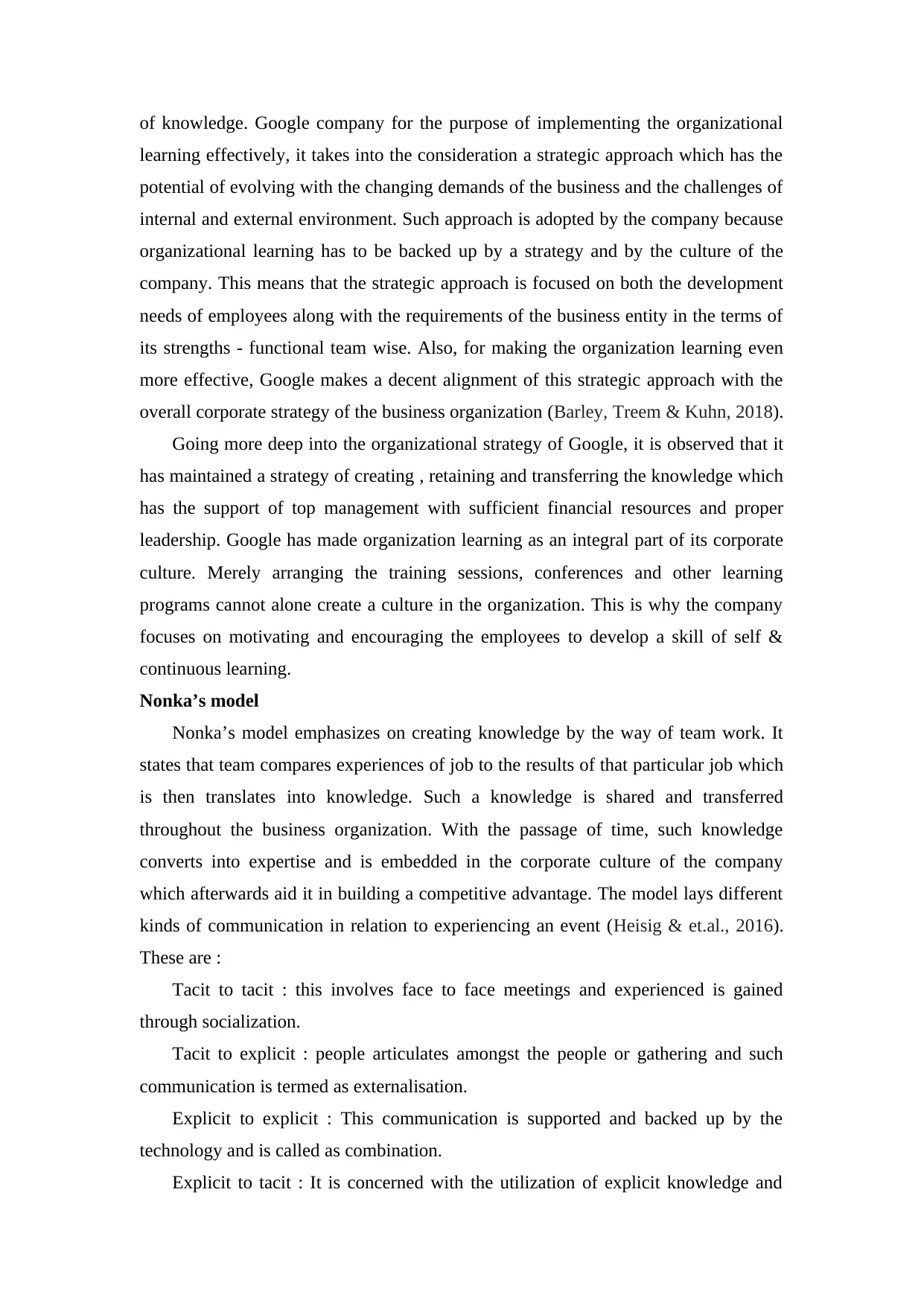
of knowledge. Google company for the purpose of implementing the organizational
learning effectively, it takes into the consideration a strategic approach which has the
potential of evolving with the changing demands of the business and the challenges of
internal and external environment. Such approach is adopted by the company because
organizational learning has to be backed up by a strategy and by the culture of the
company. This means that the strategic approach is focused on both the development
needs of employees along with the requirements of the business entity in the terms of
its strengths - functional team wise. Also, for making the organization learning even
more effective, Google makes a decent alignment of this strategic approach with the
overall corporate strategy of the business organization (Barley, Treem & Kuhn, 2018).
Going more deep into the organizational strategy of Google, it is observed that it
has maintained a strategy of creating , retaining and transferring the knowledge which
has the support of top management with sufficient financial resources and proper
leadership. Google has made organization learning as an integral part of its corporate
culture. Merely arranging the training sessions, conferences and other learning
programs cannot alone create a culture in the organization. This is why the company
focuses on motivating and encouraging the employees to develop a skill of self &
continuous learning.
Nonka’s model
Nonka’s model emphasizes on creating knowledge by the way of team work. It
states that team compares experiences of job to the results of that particular job which
is then translates into knowledge. Such a knowledge is shared and transferred
throughout the business organization. With the passage of time, such knowledge
converts into expertise and is embedded in the corporate culture of the company
which afterwards aid it in building a competitive advantage. The model lays different
kinds of communication in relation to experiencing an event (Heisig & et.al., 2016).
These are :
Tacit to tacit : this involves face to face meetings and experienced is gained
through socialization.
Tacit to explicit : people articulates amongst the people or gathering and such
communication is termed as externalisation.
Explicit to explicit : This communication is supported and backed up by the
technology and is called as combination.
Explicit to tacit : It is concerned with the utilization of explicit knowledge and
learning effectively, it takes into the consideration a strategic approach which has the
potential of evolving with the changing demands of the business and the challenges of
internal and external environment. Such approach is adopted by the company because
organizational learning has to be backed up by a strategy and by the culture of the
company. This means that the strategic approach is focused on both the development
needs of employees along with the requirements of the business entity in the terms of
its strengths - functional team wise. Also, for making the organization learning even
more effective, Google makes a decent alignment of this strategic approach with the
overall corporate strategy of the business organization (Barley, Treem & Kuhn, 2018).
Going more deep into the organizational strategy of Google, it is observed that it
has maintained a strategy of creating , retaining and transferring the knowledge which
has the support of top management with sufficient financial resources and proper
leadership. Google has made organization learning as an integral part of its corporate
culture. Merely arranging the training sessions, conferences and other learning
programs cannot alone create a culture in the organization. This is why the company
focuses on motivating and encouraging the employees to develop a skill of self &
continuous learning.
Nonka’s model
Nonka’s model emphasizes on creating knowledge by the way of team work. It
states that team compares experiences of job to the results of that particular job which
is then translates into knowledge. Such a knowledge is shared and transferred
throughout the business organization. With the passage of time, such knowledge
converts into expertise and is embedded in the corporate culture of the company
which afterwards aid it in building a competitive advantage. The model lays different
kinds of communication in relation to experiencing an event (Heisig & et.al., 2016).
These are :
Tacit to tacit : this involves face to face meetings and experienced is gained
through socialization.
Tacit to explicit : people articulates amongst the people or gathering and such
communication is termed as externalisation.
Explicit to explicit : This communication is supported and backed up by the
technology and is called as combination.
Explicit to tacit : It is concerned with the utilization of explicit knowledge and
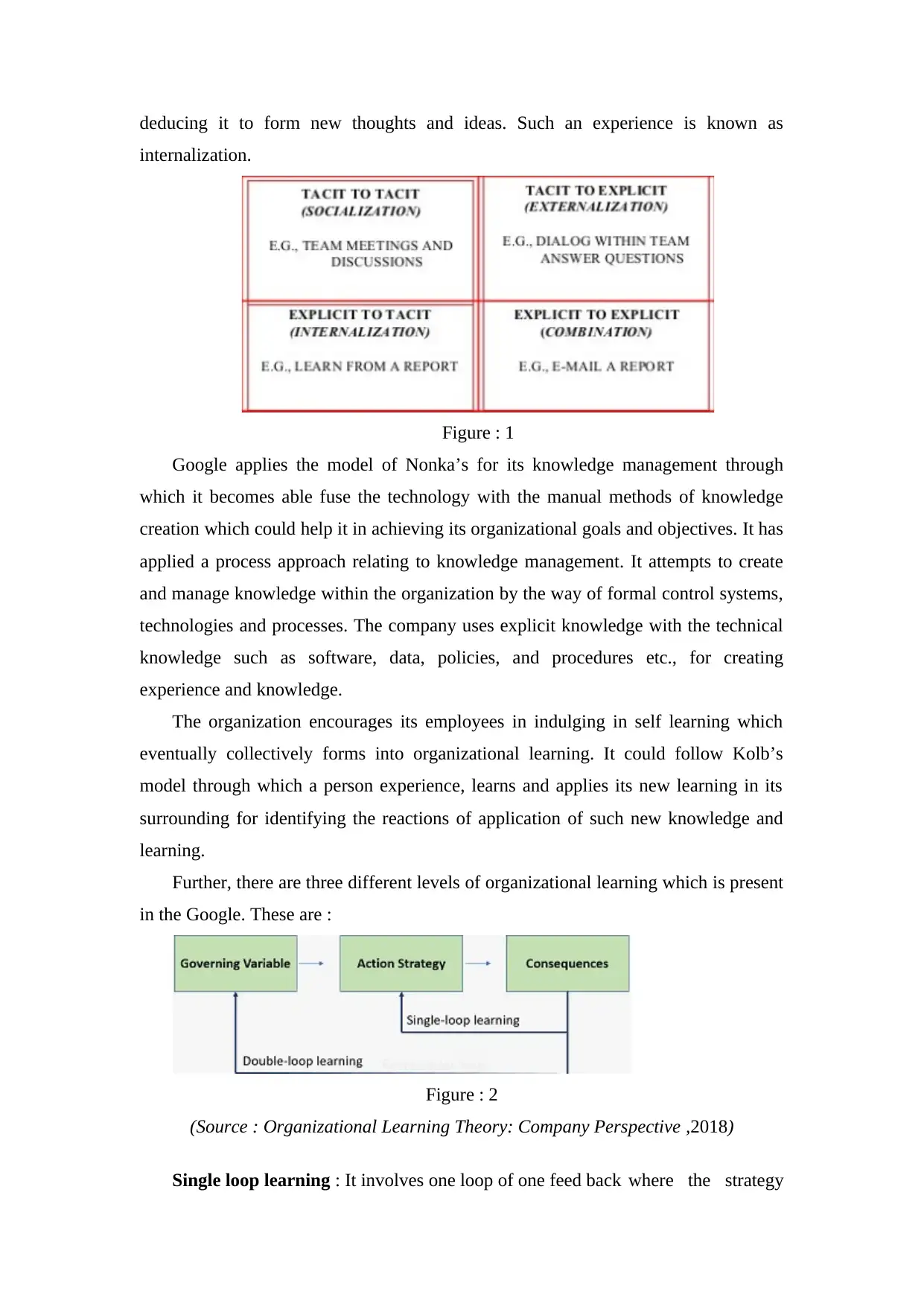
deducing it to form new thoughts and ideas. Such an experience is known as
internalization.
Figure : 1
Google applies the model of Nonka’s for its knowledge management through
which it becomes able fuse the technology with the manual methods of knowledge
creation which could help it in achieving its organizational goals and objectives. It has
applied a process approach relating to knowledge management. It attempts to create
and manage knowledge within the organization by the way of formal control systems,
technologies and processes. The company uses explicit knowledge with the technical
knowledge such as software, data, policies, and procedures etc., for creating
experience and knowledge.
The organization encourages its employees in indulging in self learning which
eventually collectively forms into organizational learning. It could follow Kolb’s
model through which a person experience, learns and applies its new learning in its
surrounding for identifying the reactions of application of such new knowledge and
learning.
Further, there are three different levels of organizational learning which is present
in the Google. These are :
Figure : 2
(Source : Organizational Learning Theory: Company Perspective ,2018)
Single loop learning : It involves one loop of one feed back where the strategy
internalization.
Figure : 1
Google applies the model of Nonka’s for its knowledge management through
which it becomes able fuse the technology with the manual methods of knowledge
creation which could help it in achieving its organizational goals and objectives. It has
applied a process approach relating to knowledge management. It attempts to create
and manage knowledge within the organization by the way of formal control systems,
technologies and processes. The company uses explicit knowledge with the technical
knowledge such as software, data, policies, and procedures etc., for creating
experience and knowledge.
The organization encourages its employees in indulging in self learning which
eventually collectively forms into organizational learning. It could follow Kolb’s
model through which a person experience, learns and applies its new learning in its
surrounding for identifying the reactions of application of such new knowledge and
learning.
Further, there are three different levels of organizational learning which is present
in the Google. These are :
Figure : 2
(Source : Organizational Learning Theory: Company Perspective ,2018)
Single loop learning : It involves one loop of one feed back where the strategy
⊘ This is a preview!⊘
Do you want full access?
Subscribe today to unlock all pages.

Trusted by 1+ million students worldwide
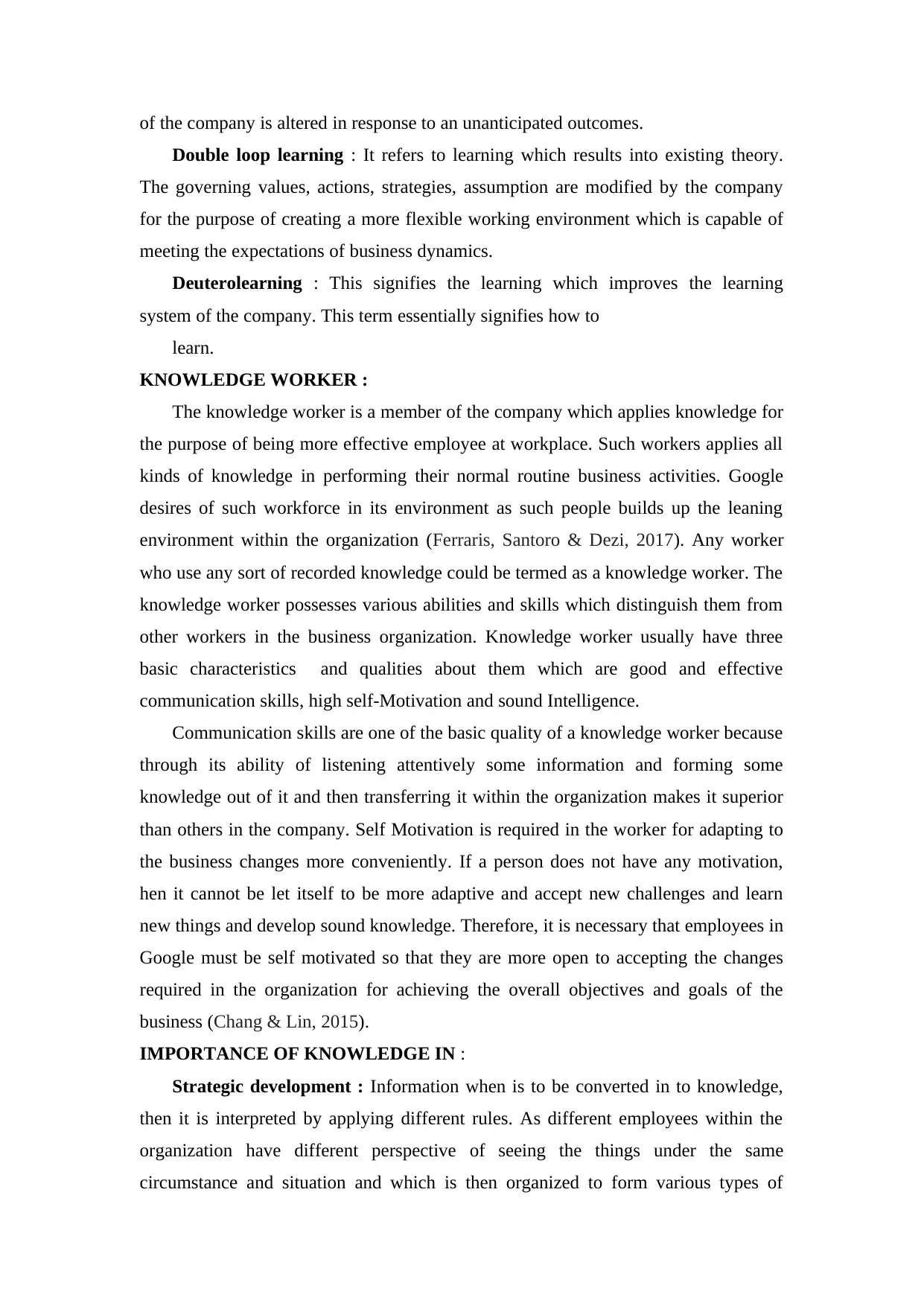
of the company is altered in response to an unanticipated outcomes.
Double loop learning : It refers to learning which results into existing theory.
The governing values, actions, strategies, assumption are modified by the company
for the purpose of creating a more flexible working environment which is capable of
meeting the expectations of business dynamics.
Deuterolearning : This signifies the learning which improves the learning
system of the company. This term essentially signifies how to
learn.
KNOWLEDGE WORKER :
The knowledge worker is a member of the company which applies knowledge for
the purpose of being more effective employee at workplace. Such workers applies all
kinds of knowledge in performing their normal routine business activities. Google
desires of such workforce in its environment as such people builds up the leaning
environment within the organization (Ferraris, Santoro & Dezi, 2017). Any worker
who use any sort of recorded knowledge could be termed as a knowledge worker. The
knowledge worker possesses various abilities and skills which distinguish them from
other workers in the business organization. Knowledge worker usually have three
basic characteristics and qualities about them which are good and effective
communication skills, high self-Motivation and sound Intelligence.
Communication skills are one of the basic quality of a knowledge worker because
through its ability of listening attentively some information and forming some
knowledge out of it and then transferring it within the organization makes it superior
than others in the company. Self Motivation is required in the worker for adapting to
the business changes more conveniently. If a person does not have any motivation,
hen it cannot be let itself to be more adaptive and accept new challenges and learn
new things and develop sound knowledge. Therefore, it is necessary that employees in
Google must be self motivated so that they are more open to accepting the changes
required in the organization for achieving the overall objectives and goals of the
business (Chang & Lin, 2015).
IMPORTANCE OF KNOWLEDGE IN :
Strategic development : Information when is to be converted in to knowledge,
then it is interpreted by applying different rules. As different employees within the
organization have different perspective of seeing the things under the same
circumstance and situation and which is then organized to form various types of
Double loop learning : It refers to learning which results into existing theory.
The governing values, actions, strategies, assumption are modified by the company
for the purpose of creating a more flexible working environment which is capable of
meeting the expectations of business dynamics.
Deuterolearning : This signifies the learning which improves the learning
system of the company. This term essentially signifies how to
learn.
KNOWLEDGE WORKER :
The knowledge worker is a member of the company which applies knowledge for
the purpose of being more effective employee at workplace. Such workers applies all
kinds of knowledge in performing their normal routine business activities. Google
desires of such workforce in its environment as such people builds up the leaning
environment within the organization (Ferraris, Santoro & Dezi, 2017). Any worker
who use any sort of recorded knowledge could be termed as a knowledge worker. The
knowledge worker possesses various abilities and skills which distinguish them from
other workers in the business organization. Knowledge worker usually have three
basic characteristics and qualities about them which are good and effective
communication skills, high self-Motivation and sound Intelligence.
Communication skills are one of the basic quality of a knowledge worker because
through its ability of listening attentively some information and forming some
knowledge out of it and then transferring it within the organization makes it superior
than others in the company. Self Motivation is required in the worker for adapting to
the business changes more conveniently. If a person does not have any motivation,
hen it cannot be let itself to be more adaptive and accept new challenges and learn
new things and develop sound knowledge. Therefore, it is necessary that employees in
Google must be self motivated so that they are more open to accepting the changes
required in the organization for achieving the overall objectives and goals of the
business (Chang & Lin, 2015).
IMPORTANCE OF KNOWLEDGE IN :
Strategic development : Information when is to be converted in to knowledge,
then it is interpreted by applying different rules. As different employees within the
organization have different perspective of seeing the things under the same
circumstance and situation and which is then organized to form various types of
Paraphrase This Document
Need a fresh take? Get an instant paraphrase of this document with our AI Paraphraser
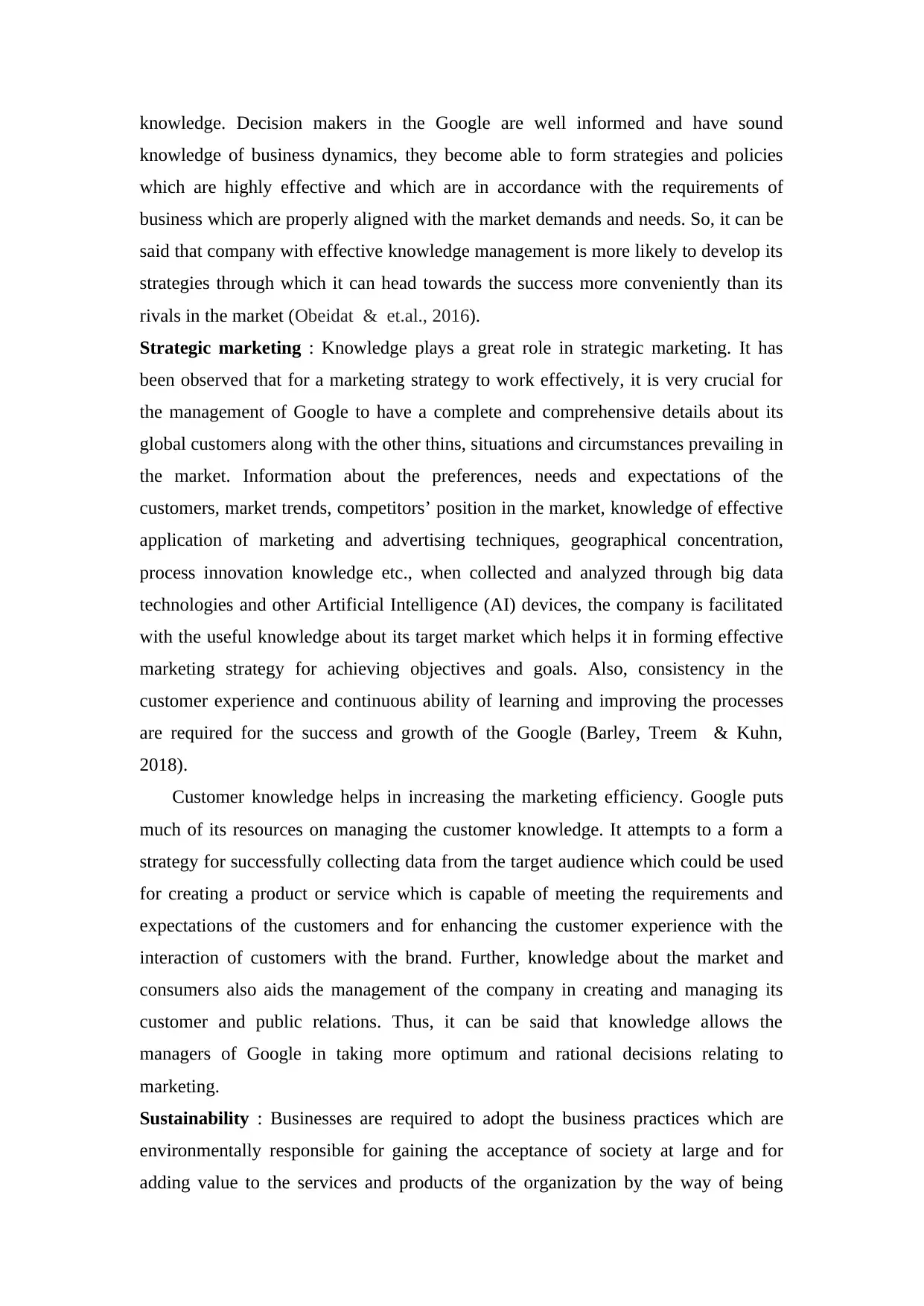
knowledge. Decision makers in the Google are well informed and have sound
knowledge of business dynamics, they become able to form strategies and policies
which are highly effective and which are in accordance with the requirements of
business which are properly aligned with the market demands and needs. So, it can be
said that company with effective knowledge management is more likely to develop its
strategies through which it can head towards the success more conveniently than its
rivals in the market (Obeidat & et.al., 2016).
Strategic marketing : Knowledge plays a great role in strategic marketing. It has
been observed that for a marketing strategy to work effectively, it is very crucial for
the management of Google to have a complete and comprehensive details about its
global customers along with the other thins, situations and circumstances prevailing in
the market. Information about the preferences, needs and expectations of the
customers, market trends, competitors’ position in the market, knowledge of effective
application of marketing and advertising techniques, geographical concentration,
process innovation knowledge etc., when collected and analyzed through big data
technologies and other Artificial Intelligence (AI) devices, the company is facilitated
with the useful knowledge about its target market which helps it in forming effective
marketing strategy for achieving objectives and goals. Also, consistency in the
customer experience and continuous ability of learning and improving the processes
are required for the success and growth of the Google (Barley, Treem & Kuhn,
2018).
Customer knowledge helps in increasing the marketing efficiency. Google puts
much of its resources on managing the customer knowledge. It attempts to a form a
strategy for successfully collecting data from the target audience which could be used
for creating a product or service which is capable of meeting the requirements and
expectations of the customers and for enhancing the customer experience with the
interaction of customers with the brand. Further, knowledge about the market and
consumers also aids the management of the company in creating and managing its
customer and public relations. Thus, it can be said that knowledge allows the
managers of Google in taking more optimum and rational decisions relating to
marketing.
Sustainability : Businesses are required to adopt the business practices which are
environmentally responsible for gaining the acceptance of society at large and for
adding value to the services and products of the organization by the way of being
knowledge of business dynamics, they become able to form strategies and policies
which are highly effective and which are in accordance with the requirements of
business which are properly aligned with the market demands and needs. So, it can be
said that company with effective knowledge management is more likely to develop its
strategies through which it can head towards the success more conveniently than its
rivals in the market (Obeidat & et.al., 2016).
Strategic marketing : Knowledge plays a great role in strategic marketing. It has
been observed that for a marketing strategy to work effectively, it is very crucial for
the management of Google to have a complete and comprehensive details about its
global customers along with the other thins, situations and circumstances prevailing in
the market. Information about the preferences, needs and expectations of the
customers, market trends, competitors’ position in the market, knowledge of effective
application of marketing and advertising techniques, geographical concentration,
process innovation knowledge etc., when collected and analyzed through big data
technologies and other Artificial Intelligence (AI) devices, the company is facilitated
with the useful knowledge about its target market which helps it in forming effective
marketing strategy for achieving objectives and goals. Also, consistency in the
customer experience and continuous ability of learning and improving the processes
are required for the success and growth of the Google (Barley, Treem & Kuhn,
2018).
Customer knowledge helps in increasing the marketing efficiency. Google puts
much of its resources on managing the customer knowledge. It attempts to a form a
strategy for successfully collecting data from the target audience which could be used
for creating a product or service which is capable of meeting the requirements and
expectations of the customers and for enhancing the customer experience with the
interaction of customers with the brand. Further, knowledge about the market and
consumers also aids the management of the company in creating and managing its
customer and public relations. Thus, it can be said that knowledge allows the
managers of Google in taking more optimum and rational decisions relating to
marketing.
Sustainability : Businesses are required to adopt the business practices which are
environmentally responsible for gaining the acceptance of society at large and for
adding value to the services and products of the organization by the way of being
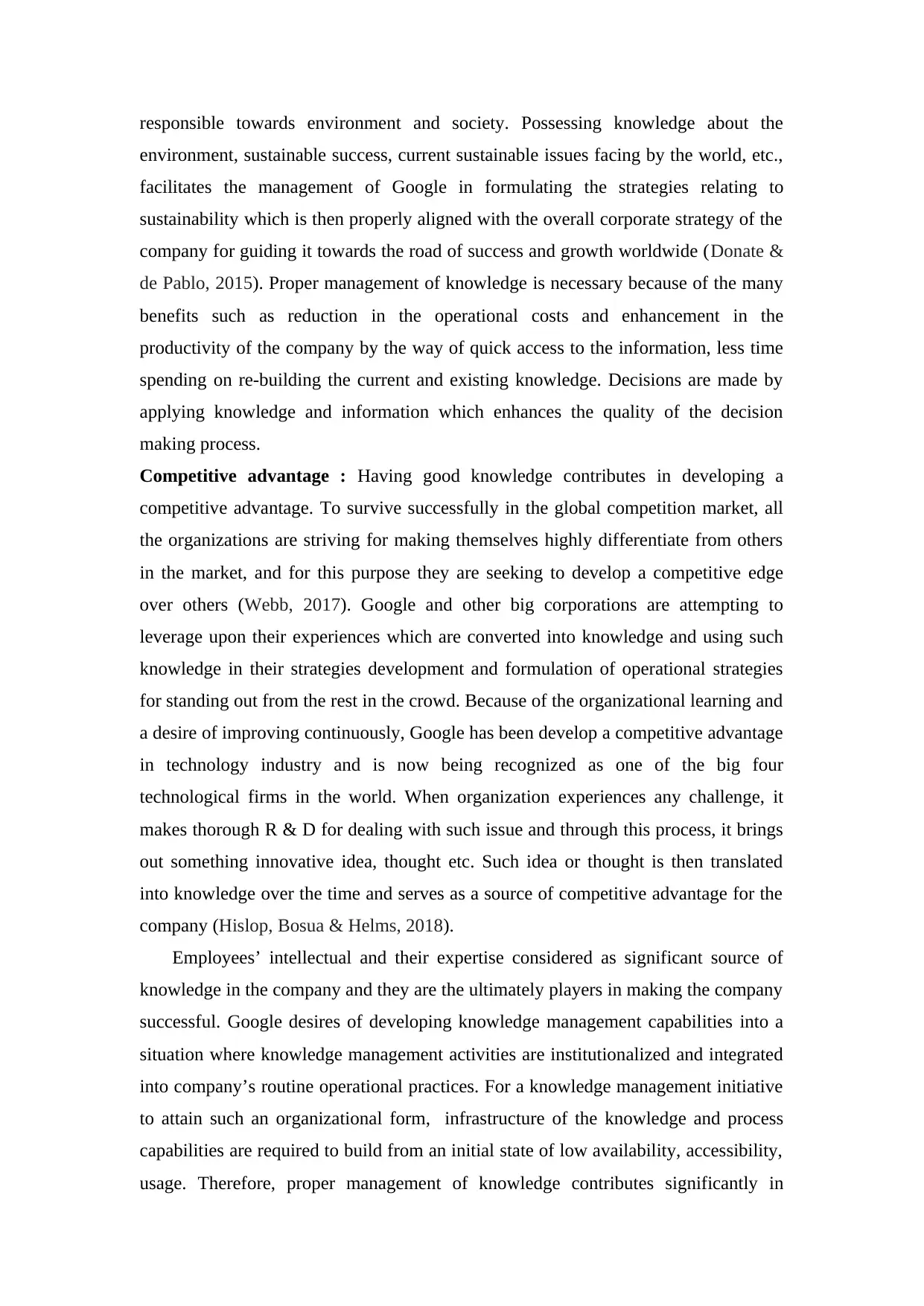
responsible towards environment and society. Possessing knowledge about the
environment, sustainable success, current sustainable issues facing by the world, etc.,
facilitates the management of Google in formulating the strategies relating to
sustainability which is then properly aligned with the overall corporate strategy of the
company for guiding it towards the road of success and growth worldwide (Donate &
de Pablo, 2015). Proper management of knowledge is necessary because of the many
benefits such as reduction in the operational costs and enhancement in the
productivity of the company by the way of quick access to the information, less time
spending on re-building the current and existing knowledge. Decisions are made by
applying knowledge and information which enhances the quality of the decision
making process.
Competitive advantage : Having good knowledge contributes in developing a
competitive advantage. To survive successfully in the global competition market, all
the organizations are striving for making themselves highly differentiate from others
in the market, and for this purpose they are seeking to develop a competitive edge
over others (Webb, 2017). Google and other big corporations are attempting to
leverage upon their experiences which are converted into knowledge and using such
knowledge in their strategies development and formulation of operational strategies
for standing out from the rest in the crowd. Because of the organizational learning and
a desire of improving continuously, Google has been develop a competitive advantage
in technology industry and is now being recognized as one of the big four
technological firms in the world. When organization experiences any challenge, it
makes thorough R & D for dealing with such issue and through this process, it brings
out something innovative idea, thought etc. Such idea or thought is then translated
into knowledge over the time and serves as a source of competitive advantage for the
company (Hislop, Bosua & Helms, 2018).
Employees’ intellectual and their expertise considered as significant source of
knowledge in the company and they are the ultimately players in making the company
successful. Google desires of developing knowledge management capabilities into a
situation where knowledge management activities are institutionalized and integrated
into company’s routine operational practices. For a knowledge management initiative
to attain such an organizational form, infrastructure of the knowledge and process
capabilities are required to build from an initial state of low availability, accessibility,
usage. Therefore, proper management of knowledge contributes significantly in
environment, sustainable success, current sustainable issues facing by the world, etc.,
facilitates the management of Google in formulating the strategies relating to
sustainability which is then properly aligned with the overall corporate strategy of the
company for guiding it towards the road of success and growth worldwide (Donate &
de Pablo, 2015). Proper management of knowledge is necessary because of the many
benefits such as reduction in the operational costs and enhancement in the
productivity of the company by the way of quick access to the information, less time
spending on re-building the current and existing knowledge. Decisions are made by
applying knowledge and information which enhances the quality of the decision
making process.
Competitive advantage : Having good knowledge contributes in developing a
competitive advantage. To survive successfully in the global competition market, all
the organizations are striving for making themselves highly differentiate from others
in the market, and for this purpose they are seeking to develop a competitive edge
over others (Webb, 2017). Google and other big corporations are attempting to
leverage upon their experiences which are converted into knowledge and using such
knowledge in their strategies development and formulation of operational strategies
for standing out from the rest in the crowd. Because of the organizational learning and
a desire of improving continuously, Google has been develop a competitive advantage
in technology industry and is now being recognized as one of the big four
technological firms in the world. When organization experiences any challenge, it
makes thorough R & D for dealing with such issue and through this process, it brings
out something innovative idea, thought etc. Such idea or thought is then translated
into knowledge over the time and serves as a source of competitive advantage for the
company (Hislop, Bosua & Helms, 2018).
Employees’ intellectual and their expertise considered as significant source of
knowledge in the company and they are the ultimately players in making the company
successful. Google desires of developing knowledge management capabilities into a
situation where knowledge management activities are institutionalized and integrated
into company’s routine operational practices. For a knowledge management initiative
to attain such an organizational form, infrastructure of the knowledge and process
capabilities are required to build from an initial state of low availability, accessibility,
usage. Therefore, proper management of knowledge contributes significantly in
⊘ This is a preview!⊘
Do you want full access?
Subscribe today to unlock all pages.

Trusted by 1+ million students worldwide
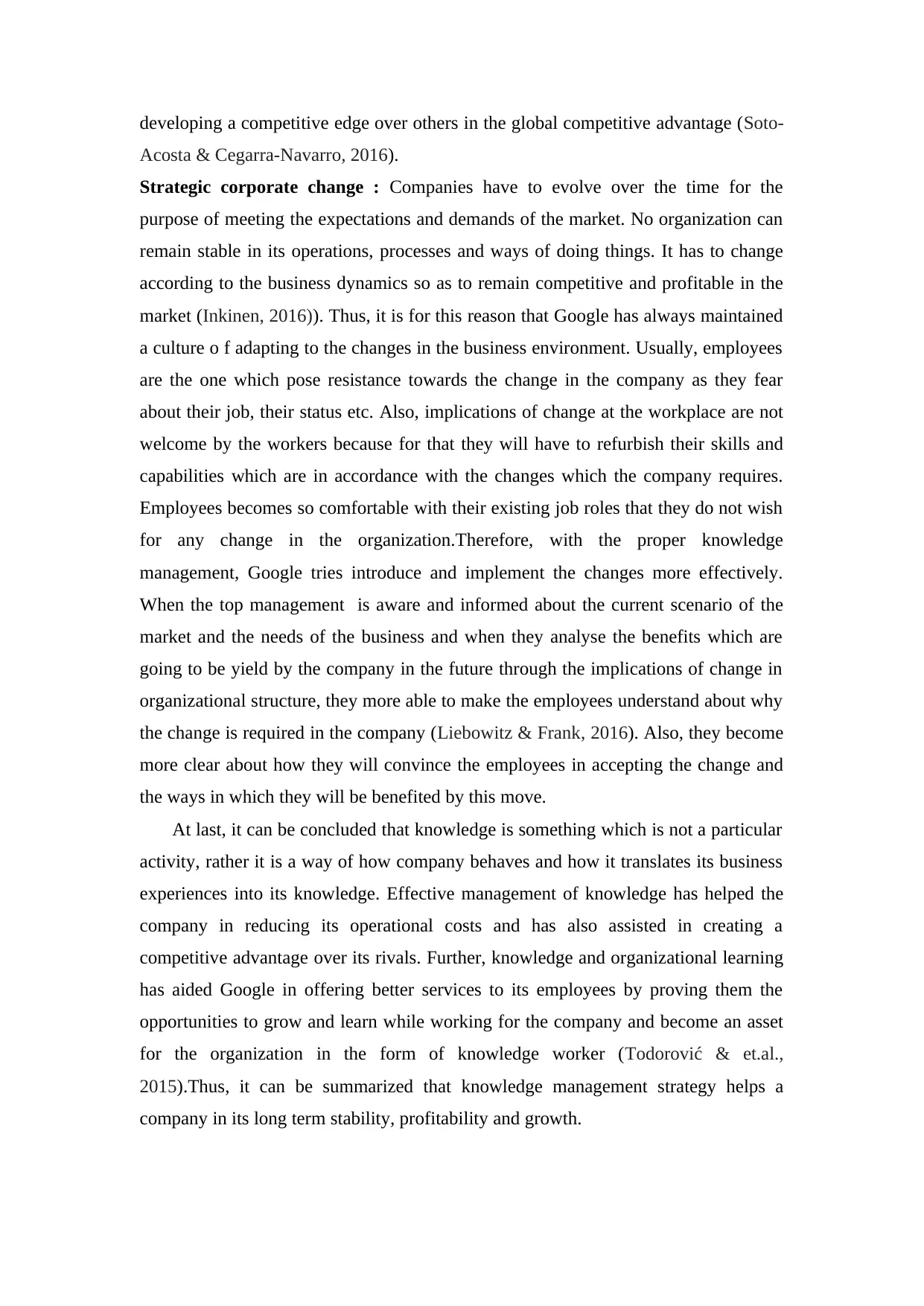
developing a competitive edge over others in the global competitive advantage (Soto-
Acosta & Cegarra-Navarro, 2016).
Strategic corporate change : Companies have to evolve over the time for the
purpose of meeting the expectations and demands of the market. No organization can
remain stable in its operations, processes and ways of doing things. It has to change
according to the business dynamics so as to remain competitive and profitable in the
market (Inkinen, 2016)). Thus, it is for this reason that Google has always maintained
a culture o f adapting to the changes in the business environment. Usually, employees
are the one which pose resistance towards the change in the company as they fear
about their job, their status etc. Also, implications of change at the workplace are not
welcome by the workers because for that they will have to refurbish their skills and
capabilities which are in accordance with the changes which the company requires.
Employees becomes so comfortable with their existing job roles that they do not wish
for any change in the organization.Therefore, with the proper knowledge
management, Google tries introduce and implement the changes more effectively.
When the top management is aware and informed about the current scenario of the
market and the needs of the business and when they analyse the benefits which are
going to be yield by the company in the future through the implications of change in
organizational structure, they more able to make the employees understand about why
the change is required in the company (Liebowitz & Frank, 2016). Also, they become
more clear about how they will convince the employees in accepting the change and
the ways in which they will be benefited by this move.
At last, it can be concluded that knowledge is something which is not a particular
activity, rather it is a way of how company behaves and how it translates its business
experiences into its knowledge. Effective management of knowledge has helped the
company in reducing its operational costs and has also assisted in creating a
competitive advantage over its rivals. Further, knowledge and organizational learning
has aided Google in offering better services to its employees by proving them the
opportunities to grow and learn while working for the company and become an asset
for the organization in the form of knowledge worker (Todorović & et.al.,
2015).Thus, it can be summarized that knowledge management strategy helps a
company in its long term stability, profitability and growth.
Acosta & Cegarra-Navarro, 2016).
Strategic corporate change : Companies have to evolve over the time for the
purpose of meeting the expectations and demands of the market. No organization can
remain stable in its operations, processes and ways of doing things. It has to change
according to the business dynamics so as to remain competitive and profitable in the
market (Inkinen, 2016)). Thus, it is for this reason that Google has always maintained
a culture o f adapting to the changes in the business environment. Usually, employees
are the one which pose resistance towards the change in the company as they fear
about their job, their status etc. Also, implications of change at the workplace are not
welcome by the workers because for that they will have to refurbish their skills and
capabilities which are in accordance with the changes which the company requires.
Employees becomes so comfortable with their existing job roles that they do not wish
for any change in the organization.Therefore, with the proper knowledge
management, Google tries introduce and implement the changes more effectively.
When the top management is aware and informed about the current scenario of the
market and the needs of the business and when they analyse the benefits which are
going to be yield by the company in the future through the implications of change in
organizational structure, they more able to make the employees understand about why
the change is required in the company (Liebowitz & Frank, 2016). Also, they become
more clear about how they will convince the employees in accepting the change and
the ways in which they will be benefited by this move.
At last, it can be concluded that knowledge is something which is not a particular
activity, rather it is a way of how company behaves and how it translates its business
experiences into its knowledge. Effective management of knowledge has helped the
company in reducing its operational costs and has also assisted in creating a
competitive advantage over its rivals. Further, knowledge and organizational learning
has aided Google in offering better services to its employees by proving them the
opportunities to grow and learn while working for the company and become an asset
for the organization in the form of knowledge worker (Todorović & et.al.,
2015).Thus, it can be summarized that knowledge management strategy helps a
company in its long term stability, profitability and growth.
Paraphrase This Document
Need a fresh take? Get an instant paraphrase of this document with our AI Paraphraser
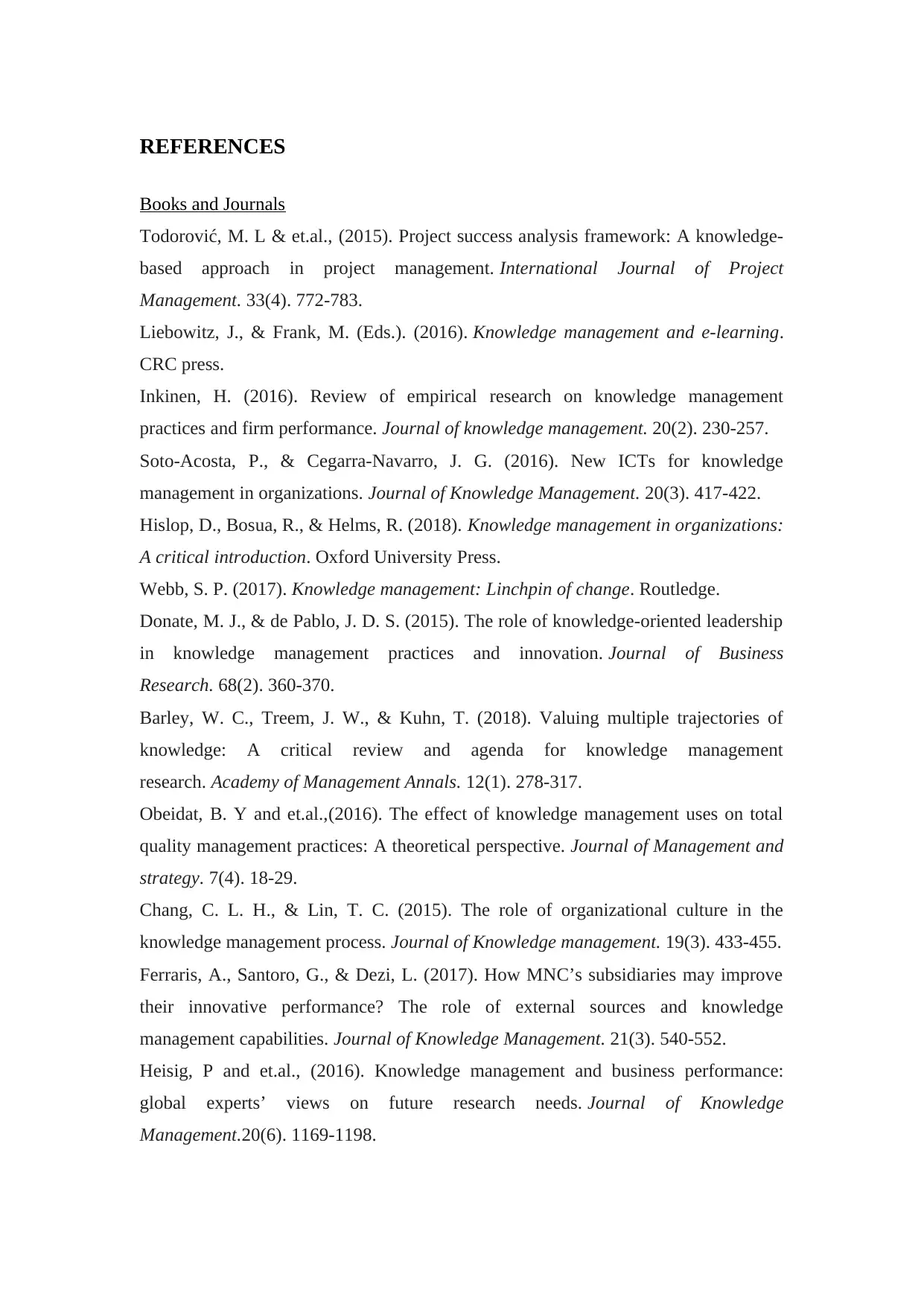
REFERENCES
Books and Journals
Todorović, M. L & et.al., (2015). Project success analysis framework: A knowledge-
based approach in project management. International Journal of Project
Management. 33(4). 772-783.
Liebowitz, J., & Frank, M. (Eds.). (2016). Knowledge management and e-learning.
CRC press.
Inkinen, H. (2016). Review of empirical research on knowledge management
practices and firm performance. Journal of knowledge management. 20(2). 230-257.
Soto-Acosta, P., & Cegarra-Navarro, J. G. (2016). New ICTs for knowledge
management in organizations. Journal of Knowledge Management. 20(3). 417-422.
Hislop, D., Bosua, R., & Helms, R. (2018). Knowledge management in organizations:
A critical introduction. Oxford University Press.
Webb, S. P. (2017). Knowledge management: Linchpin of change. Routledge.
Donate, M. J., & de Pablo, J. D. S. (2015). The role of knowledge-oriented leadership
in knowledge management practices and innovation. Journal of Business
Research. 68(2). 360-370.
Barley, W. C., Treem, J. W., & Kuhn, T. (2018). Valuing multiple trajectories of
knowledge: A critical review and agenda for knowledge management
research. Academy of Management Annals. 12(1). 278-317.
Obeidat, B. Y and et.al.,(2016). The effect of knowledge management uses on total
quality management practices: A theoretical perspective. Journal of Management and
strategy. 7(4). 18-29.
Chang, C. L. H., & Lin, T. C. (2015). The role of organizational culture in the
knowledge management process. Journal of Knowledge management. 19(3). 433-455.
Ferraris, A., Santoro, G., & Dezi, L. (2017). How MNC’s subsidiaries may improve
their innovative performance? The role of external sources and knowledge
management capabilities. Journal of Knowledge Management. 21(3). 540-552.
Heisig, P and et.al., (2016). Knowledge management and business performance:
global experts’ views on future research needs. Journal of Knowledge
Management.20(6). 1169-1198.
Books and Journals
Todorović, M. L & et.al., (2015). Project success analysis framework: A knowledge-
based approach in project management. International Journal of Project
Management. 33(4). 772-783.
Liebowitz, J., & Frank, M. (Eds.). (2016). Knowledge management and e-learning.
CRC press.
Inkinen, H. (2016). Review of empirical research on knowledge management
practices and firm performance. Journal of knowledge management. 20(2). 230-257.
Soto-Acosta, P., & Cegarra-Navarro, J. G. (2016). New ICTs for knowledge
management in organizations. Journal of Knowledge Management. 20(3). 417-422.
Hislop, D., Bosua, R., & Helms, R. (2018). Knowledge management in organizations:
A critical introduction. Oxford University Press.
Webb, S. P. (2017). Knowledge management: Linchpin of change. Routledge.
Donate, M. J., & de Pablo, J. D. S. (2015). The role of knowledge-oriented leadership
in knowledge management practices and innovation. Journal of Business
Research. 68(2). 360-370.
Barley, W. C., Treem, J. W., & Kuhn, T. (2018). Valuing multiple trajectories of
knowledge: A critical review and agenda for knowledge management
research. Academy of Management Annals. 12(1). 278-317.
Obeidat, B. Y and et.al.,(2016). The effect of knowledge management uses on total
quality management practices: A theoretical perspective. Journal of Management and
strategy. 7(4). 18-29.
Chang, C. L. H., & Lin, T. C. (2015). The role of organizational culture in the
knowledge management process. Journal of Knowledge management. 19(3). 433-455.
Ferraris, A., Santoro, G., & Dezi, L. (2017). How MNC’s subsidiaries may improve
their innovative performance? The role of external sources and knowledge
management capabilities. Journal of Knowledge Management. 21(3). 540-552.
Heisig, P and et.al., (2016). Knowledge management and business performance:
global experts’ views on future research needs. Journal of Knowledge
Management.20(6). 1169-1198.
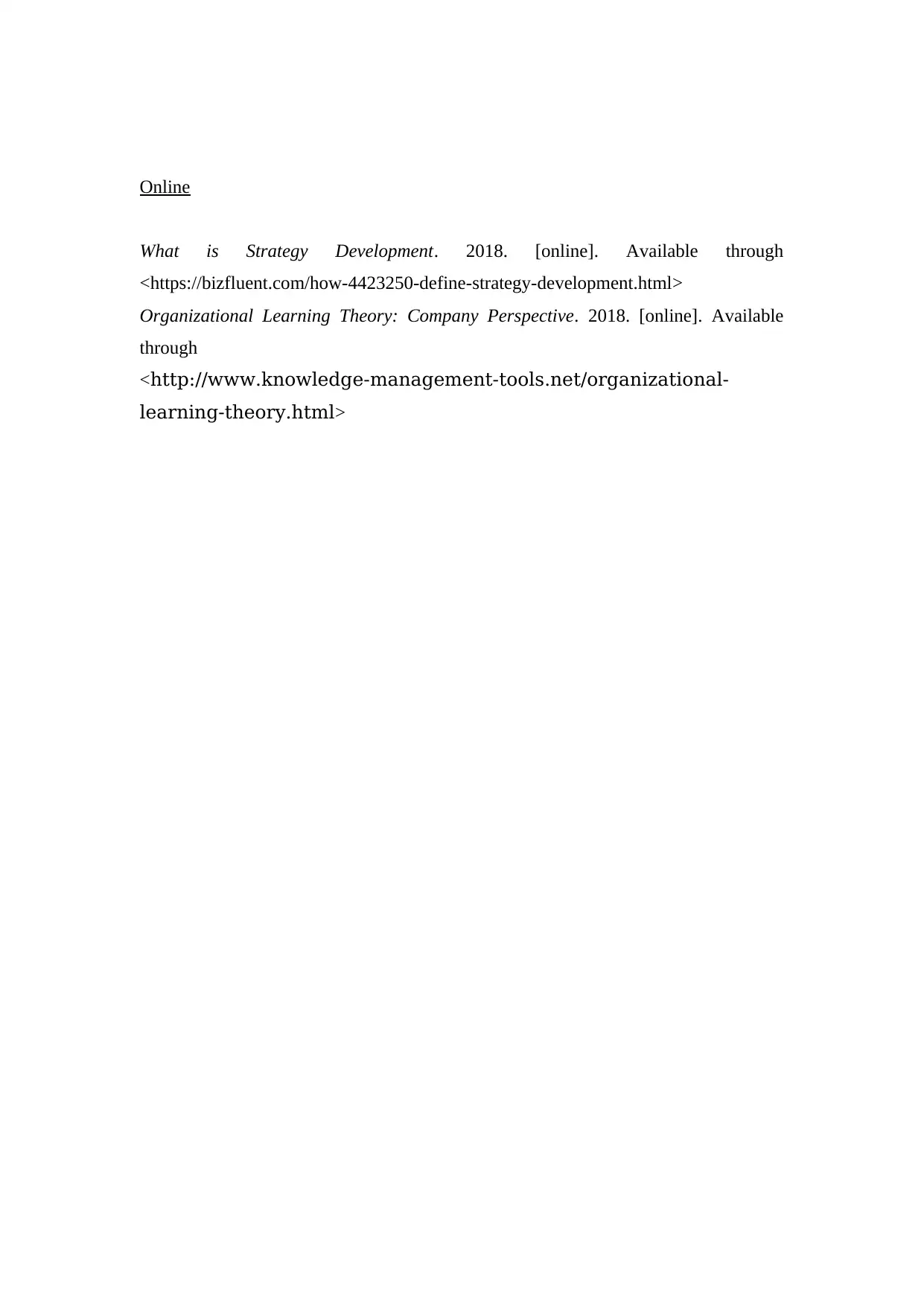
Online
What is Strategy Development. 2018. [online]. Available through
<https://bizfluent.com/how-4423250-define-strategy-development.html>
Organizational Learning Theory: Company Perspective. 2018. [online]. Available
through
<http://www.knowledge-management-tools.net/organizational-
learning-theory.html>
What is Strategy Development. 2018. [online]. Available through
<https://bizfluent.com/how-4423250-define-strategy-development.html>
Organizational Learning Theory: Company Perspective. 2018. [online]. Available
through
<http://www.knowledge-management-tools.net/organizational-
learning-theory.html>
⊘ This is a preview!⊘
Do you want full access?
Subscribe today to unlock all pages.

Trusted by 1+ million students worldwide
1 out of 12
Related Documents
Your All-in-One AI-Powered Toolkit for Academic Success.
+13062052269
info@desklib.com
Available 24*7 on WhatsApp / Email
![[object Object]](/_next/static/media/star-bottom.7253800d.svg)
Unlock your academic potential
Copyright © 2020–2026 A2Z Services. All Rights Reserved. Developed and managed by ZUCOL.





